| Article ID | Journal | Published Year | Pages | File Type |
|---|---|---|---|---|
| 2922178 | Heart Rhythm | 2013 | 6 Pages |
BackgroundAtrial fibrillation (AF) is a leading cause of total and fatal ischemic stroke. Stroke risk after AF ablation appears to be favorably affected; however, it is largely unknown whether the benefit extends to all stroke CHADS2 risk profiles of AF patients.ObjectiveTo determine if ablation of atrial fibrillation reduces stroke rates in all risk groups.MethodsA total of 4212 consecutive patients who underwent AF ablation were compared (1:4) with 16,848 age-/sex-matched controls with AF (no ablation) and to 16,848 age-/sex-matched controls without AF. Patients were enrolled from the large ongoing prospective Intermountain Atrial Fibrillation Study and were followed for at least 3 years.ResultsOf the 37,908 patients, the mean age was 65.0 ± 13 years and 4.4% (no AF), 6.3% (AF, no ablation), and 4.5% (AF ablation) patients had a prior stroke (P < .0001). The profile of CHADS2 scores between comparative groups was similar: 0–1 (69.3%, no AF; 62.3%, AF, no ablation; 63.6%, AF ablation), 2–3 (26.5%, no AF; 29.7%, AF, no ablation; 28.7%, AF ablation), and ≥4 (4.3%, no AF; 8.0%, AF, no ablation; 7.7%, AF ablation). A total of 1296 (3.4%) patients had a stroke over the follow-up period. Across all CHADS2 profiles and ages, AF patients with ablation had a lower long-term risk of stroke compared to patients without ablation. Furthermore, AF ablation patients had similar long-term risks of stroke across all CHADS2 profiles and ages compared to patients with no history of AF.ConclusionsIn our study populations, AF ablation patients have a significantly lower risk of stroke compared to AF patients who do not undergo ablation independent of baseline stroke risk score.
